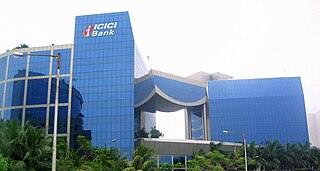
Microfinance is a category of financial services targeting individuals and small businesses who lack access to conventional banking and related services. Microfinance includes microcredit, the provision of small loans to poor clients; savings and checking accounts; microinsurance; and payment systems, among other services. Microfinance services are designed to reach excluded customers, usually poorer population segments, possibly socially marginalized, or geographically more isolated, and to help them become self-sufficient.

The Reserve Bank of India (RBI) is India's central bank and regulatory body under the jurisdiction of Ministry of Finance, Government of India. It is responsible for the issue and supply of the Indian rupee and the regulation of the Indian banking system. It also manages the country's main payment systems and works to promote its economic development. Its top official is designated as Governor who is a civil servant of the IAS or IES or ISS cadre.
Credit scores in the United States are numbers that represent the creditworthiness of a person, the likelihood that person will pay their debts.

ICICI Bank Limited is an Indian Development finance institution with its registered office in Vadodara, Gujarat and corporate office in Mumbai, Maharashtra. It offers a wide range of banking products and financial services for corporate and retail customers through a variety of delivery channels and specialised subsidiaries in the areas of investment banking, life, non-life insurance, venture capital and asset management. The bank has a network of 5,275 branches and 15,589 ATMs across India and has a presence in 17 countries.
A credit history is a record of a borrower's responsible repayment of debts. A credit report is a record of the borrower's credit history from a number of sources, including banks, credit card companies, collection agencies, and governments. A borrower's credit score is the result of a mathematical algorithm applied to a credit report and other sources of information to predict future delinquency.
A credit bureau is a data collection agency that gathers account information from various creditors and provides that information to a consumer reporting agency in the United States, a credit reference agency in the United Kingdom, a credit reporting body in Australia, a credit information company (CIC) in India, Special Accessing Entity in the Philippines, and also to private lenders. It is not the same as a credit rating agency.
A credit score is a numerical expression based on a level analysis of a person's credit files, to represent the creditworthiness of an individual. A credit score is primarily based on a credit report, information typically sourced from credit bureaus.
HDFC Bank Limited is an Indian Development finance institution headquartered in Mumbai, Maharashtra. It has a base of 104,154 permanent employees as of 30 June 2019. HDFC Bank is India’s largest private sector bank by assets. It is the largest bank in India by market capitalisation as of March 2020.

Small Industries Development Bank of India (SIDBI) is a regulatory agency in India, under the jurisdiction of Ministry of Finance, Government of India headquartered at Lucknow and having its offices all over the country. Its purpose is to provide refinance facilities and short-term lending to industries, and serves as the principal financial institution in the Micro, Small and Medium Enterprises (MSME) sector. SIDBI also coordinates the functions of institutions engaged in similar activities. It was established on 2 April 1990, through an Act of Parliament. It is headquartered in Lucknow. SIDBI operates under the Ministry of Finance, Government of India.
Payment and settlement systems in India are used for financial transactions. They are covered by the Payment and Settlement Systems Act, 2007, legislated in December 2007 and regulated by the Reserve Bank of India and the Board for Regulation and Supervision of Payment and Settlement Systems.

The National Tiger Conservation Authority (NTCA) was established in December 2005 following a recommendation of the Tiger Task Force, constituted by the Prime Minister of India for reorganised management of Project Tiger and the many Tiger Reserves in India.
TransUnion CIBIL Limited is a credit information company operating in India. It maintains credit files on 600 million individuals and 32 million businesses. TransUnion is one of four credit bureaus operating in India and is part of TransUnion, an American multinational group.
Financial inclusion is defined as the availability and equality of opportunities to access financial services. It refers to a process by which individuals and businesses can access appropriate, affordable, and timely financial products and services. These include banking, loan, equity, and insurance products. Financial inclusion efforts typically target those who are unbanked and underbanked, and directs sustainable financial services to them. Financial inclusion is understood to go beyond merely opening a bank account. It is possible for banked individuals to be excluded from financial services. Having more inclusive financial systems has been linked to stronger and more sustainable economic growth and development and thus achieving financial inclusion has become a priority for many countries across the globe.

A bank is a financial institution that accepts deposits from the public and creates a demand deposit while simultaneously making loans. Lending activities can be directly performed by the bank or indirectly through capital markets.

The Dodd–Frank Wall Street Reform and Consumer Protection Act is a United States federal law that was enacted on July 21, 2010. The law overhauled financial regulation in the aftermath of the Great Recession, and it made changes affecting all federal financial regulatory agencies and almost every part of the nation's financial services industry.

CRIF High Mark Credit Information Services Pvt. Ltd. is an RBI approved credit bureau in India. It serves retail, agriculture and rural, MSME, commercial and microfinance.

In India, black money is funds earned on the black market, on which income and other taxes have not been paid. Also, the unaccounted money that is concealed from the tax administrator is called black money. The black money is accumulated by the criminals, smugglers, hoarders, tax-evaders and other anti-social elements of society. Around 22,000 crores of rupees are supposed to have been accumulated by the criminals for vested interests, though writ petitions in the supreme court estimate this to be even larger, at ₹300 lakh crores.
Monetary policy is the process by which the monetary authority of a country, generally the central bank, controls the supply of money in the economy by its control over interest rates in order to maintain price stability and achieve high economic growth. In India, the central monetary authority is the Reserve Bank of India (RBI).
Lenddo is a Singapore-based software-as-a-service company which uses non-traditional data comprising social media and smartphone records in order to ascertain customers' financial stability. Its vision is "to improve financial inclusion for at least a billion people" in developing countries around the world. In October 2013, Lenddo had over 350,000 members globally.
Small finance banks are a type of niche banks in India. Banks with a small finance bank license can provide basic banking service of acceptance of deposits and lending. The aim behind these to provide financial inclusion to sections of the economy not being served by other banks, such as small business units, small and marginal farmers, micro and small industries and unorganised sector entities.








